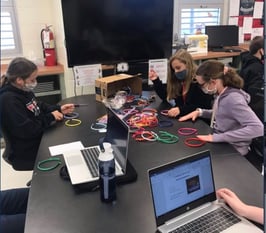 Entrepreneurs and educators have something in common: In order to succeed in their fields, they have to continue to innovate. The topic of innovative learning environments in education has historically been centered around the theme of physical space. Without minimizing the importance of designing spaces that lend themselves to collaboration, authenticity, or innovation, the shift to alternate learning environments (hybrid and virtual) has magnified the need to reframe and extend the definition of purposeful design of learning environments beyond simply the physical setup. As designers of educational opportunities, we need to shift our view of learning environments from physical design to intentional integration of learning experiences and activities that position our environments, no matter what and where they are, as places where entrepreneurial spirit can blossom, thrive and grow.
Entrepreneurs and educators have something in common: In order to succeed in their fields, they have to continue to innovate. The topic of innovative learning environments in education has historically been centered around the theme of physical space. Without minimizing the importance of designing spaces that lend themselves to collaboration, authenticity, or innovation, the shift to alternate learning environments (hybrid and virtual) has magnified the need to reframe and extend the definition of purposeful design of learning environments beyond simply the physical setup. As designers of educational opportunities, we need to shift our view of learning environments from physical design to intentional integration of learning experiences and activities that position our environments, no matter what and where they are, as places where entrepreneurial spirit can blossom, thrive and grow.
 The same entrepreneurship project that worked five, three, or even one year ago won’t work today—and that’s a good thing! As we shift our focus and best practices on adapting instruction and curriculum to support hybrid and/or virtual learning for middle schoolers, we can create thoughtful and innovative opportunities for our students. Here are some ideas for middle school entrepreneur project ideas.
The same entrepreneurship project that worked five, three, or even one year ago won’t work today—and that’s a good thing! As we shift our focus and best practices on adapting instruction and curriculum to support hybrid and/or virtual learning for middle schoolers, we can create thoughtful and innovative opportunities for our students. Here are some ideas for middle school entrepreneur project ideas.
Middle School Entrepreneur Skill-Building Project Ideas
Lessons in Improvisation
What possible modern benefits might there be to reviving the art of improvisation? This lesson by Owlcation which can be done in face to face, virtual or breakout room arenas, leads students through gradually increasing levels of engagement in improvisation. Connection to entrepreneurship?
- Adaptability/Pivoting: The dynamic, ever-evolving nature of improv promotes adaptability to the needs of counterparts in order to ensure success. Entrepreneurs can only be successful if they learn to pivot due to changing demands, needs of customers, or availability of materials.
- Empathy: Improv doesn’t have to be humorous, but it does need to maintain connectivity. This requires active listening skills. These skills are often developed through practice, and the more we are expected to engage in listening, the better we get at it. Entrepreneurs seek to understand the needs of their customers. Through solicitation of feedback and empathy for their customers situations or problems, they are able to better design solutions.
- Creativity: Improvisation often takes us into uncharted territory and forces our creative juices to start flowing in order to expand the conversation. As entrepreneurs, we often need to, as George Couros puts it, “innovate inside the box.” We often have constraints, but the ability to think creatively or ideate despite those barriers allows us to overcome obstacles.
- Confidence: exercises in improvisation builds the confidence of its participants and promotes growth. To sell or pitch a product or service to investors or customers, the entrepreneur needs to exhibit confidence in his or her idea and often answer unexpected questions from a panel.
Innovation Game: How Decision-making Impacts ROI
This Plinko Game simulation created by Kromatic leads the player through four guided lessons. Each lesson simulates and allows the user to examine the impact of decision-making timing on return on investment. Ties to entrepreneurship?
 Evaluation: Using a business model canvas (BMC) to help make decisions early in the process allows the entrepreneur to evaluate possible opportunities or roadblocks and make adjustments.
Evaluation: Using a business model canvas (BMC) to help make decisions early in the process allows the entrepreneur to evaluate possible opportunities or roadblocks and make adjustments.- Iteration: Identifying a need for change early redirects that time and energy to apply targeted, small changes until the best potential outcome is identified.
- Application: Entrepreneurs seek to identify new business opportunities based on the existence of problems and/or customer needs. Often this means assuming calculated risks and pivoting based on customer feedback, competition, or availability of resources. As in the simulated Plinko game, entrepreneurs take what they have learned, apply their learning to their efforts, and adjust accordingly.
Chopped Kitchen Pitch Event
 During this event, teams are formed, and each team is given three “ingredients” or items that must be included in their product or service. Flippity.net has a great Randomizer Wheel that can be utilized for quick assignments of “ingredients” for teams or even for team formation. Students work in virtual team breakout rooms with a collaborative digital whiteboard to design a product or service that would meet the needs of one or more of their classmates. The goal is to create a 60-90 second pitch that convinces classmates of the need for their product.
During this event, teams are formed, and each team is given three “ingredients” or items that must be included in their product or service. Flippity.net has a great Randomizer Wheel that can be utilized for quick assignments of “ingredients” for teams or even for team formation. Students work in virtual team breakout rooms with a collaborative digital whiteboard to design a product or service that would meet the needs of one or more of their classmates. The goal is to create a 60-90 second pitch that convinces classmates of the need for their product.
- Collaboration: Teamwork is an essential part of entrepreneurship. Accepting all ideas, discussing and evaluating options openly, and working together toward a common goal are skills that need to be practiced and developed.
- Risk-taking: There are often experiences where we are put in uncomfortable positions. Having little control over materials or ingredients pushes teammates to think differently or take a risk in order to develop solutions.
- Problem Identification: In this activity, students are asked to go beyond purely creation or invention. There is the added element of designing for a purpose. Entrepreneurs seek to identify problems in order to design solutions. Teams must adhere to this purpose in order to convince classmates of a need for their creation.
- Pitching: In this mini-pitch, teams make their case for the product or service created. Mini-pitches build confidence in young entrepreneurs as they learn to “sell” their ideas to potential customers.
Our role as educators is to design learning environments that empower our students with valuable life skills and provide them with as many opportunities to grow these skills as possible.

Middle school entrepreneurship education can be a powerful tool for developing life skills and igniting student engagement, and even provide early exposure to career options. Tools like these can support entrepreneur lesson plans, and student motivation and collaboration in a flexible way.
Explore entrepreneurship for your school or district. Here's what educators are saying about entrepreneurship and student outcomes:
BLOG POST: Too Young to be Entrepreneurs? Not These Students!
